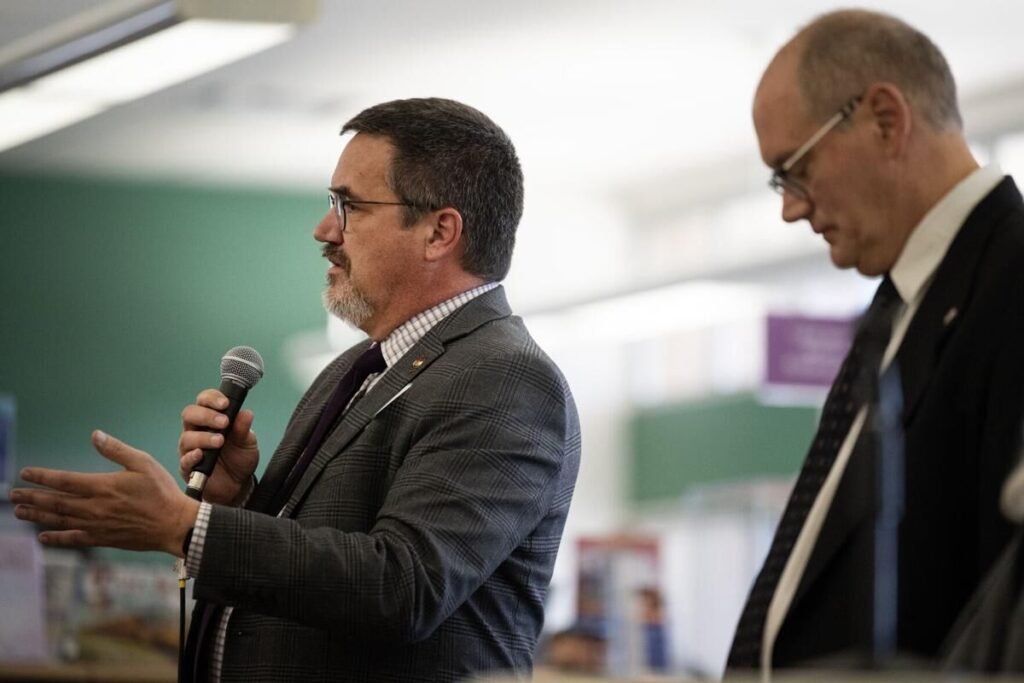Exec emails amidst 2022 Denver King Soopers strike at center of merger trial
Of the three trials attempting to halt the nearly $25 billion merger between the parent companies of King Soopers and Safeway, Colorado’s case is unique as it also aims to penalize the grocers for allegedly engaging in non-competitive practices.
Colorado Attorney General Phil Weiser’s lawsuit is seeking $1 million in civil penalties over illegal “non-poach” and “non-solicitation” agreements between Kroger and Albertsons over their employees and pharmacy prescriptions, which the grocers have repeatedly denied having in place amidst the King Soopers worker strike in 2022.
At the start of the second week in the anti-merger trial against Kroger and Albertsons, two executives responsible for labor relations at Kroger and Albertsons testified Tuesday morning about their communications ahead of a strike affecting stores in the metro Denver area.
The state’s case for the illegal agreements are based on an email exchange between the two executives.
Kroger is the parent company of King Soopers and City Market with nearly 150 stores in Colorado. Albertsons is the parent company of Safeway.
Jon McPherson, Kroger vice president of labor relations, testified he emailed his counterpart at Albertsons, Senior Vice President of Labor Relations Dan Dosenbach ahead of the strike after King Soopers leaders heard rumors of striking employees taking work at Safeway and customers moving their prescriptions to their competitors and wanted to know what Albertsons planned to do.
In the email exchange from Jan. 9, 2022, Dosenbach said Safeway didn’t intend to hire any King Soopers employees or solicit employees to move their prescriptions over their stores.
King Soopers strike: Leaders from both sides reflect
The strike started by the United Food and Commercial Workers Local 7 began Jan.12 that year and it lasted nine days. The local grocers union has been an outspoken critic of the merger, claiming it would lead to store closures and loss of jobs.
Both Dosenbach and McPherson testified saying the grocers never went into a formal agreement to not take each other’s workers during the strike. Dosenbach said he was relaying Albertsons’ internal position against hiring striking workers.
“We never committed anything to Kroger. We advised them of the internal decision that had been made prior to Mr. McPherson even forwarding his email to us,” Dosenbach said.
Dosenbach said it was “bad business” to hire striking grocery workers because strikes don’t last long, many workers go back to the stores where they have seniority and it’s expensive to onboard new employees.
State attorneys also pointed out Dosenbach forwarded the email exchange discussing the grocer’s decision to not hire or solicit prescriptions from striking King Soopers workers to other senior leaders within Albertsons and got feedback from Denver Division President Todd Broderick saying he wished King Soopers also agreed not to hire Safeway workers.
“I also pointed out it wasn’t an equal trade for Kings to agree not to hire our workers indefinitely in exchange for us agreeing not to hire workers for the limited period of the strike. He [Broderick] understands. I think he just needed to express his frustration,” according to an email from former Albertsons Director of Labor Relations Andrew Lukes to Dosenbach read out loud during the trial.
Meanwhile, McPherson said he wasn’t trying to get Albertsons to an agreement but wanted to know where the competing grocer stood to help senior leadership plan for the impending strike.
The two executives have frequently communicated amidst labor negotiations since 2020 as labor relations leaders for the largest unionized grocers in the U.S.











